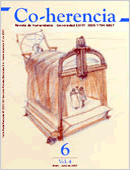question of habits.
Main Article Content
Keywords
Sor Juana, Spanish-American Colonial Culture, Transvestism, Masking
Abstract
This work represents a major achievement as part of his production, characterized by an intelligent and playful use of language, resting on well controlled discursive strategies which transform the reader into an active participant in the fictive game. Cuestión de hábitos enters the unique world of Sor Juana Inés de la Cruz, and shows the vicissitudes of the Mexican poet and dramatist whose high sensibility and intelligence make her the victim of a fanaticized religious orthodoxy. This analysis demonstrates, however, that the text is also a good example of the deceptive capacity of language to codify reality: the transvestism practised by key characters in the story narrated/staged is mirrored by the transvestism or masking of the writing itself. question of habits thus confirms the most significant characteristics of Moreno-Durán’s poetics.
Downloads
References
Álvarez De Velasco y Zorrilla, Francisco (1989) Rhytmica sacra, moral y laudatoria. Bogotá, Instituto Caro y Cuervo (Ed. de E. Porras Collantes, estudio y notas a cargo de J. Tello).
Bustillo, Carmen (1990) Barroco y América Latina. Un itinerario inconcluso. Caracas, Monte Ávila.
Buxó, José Pascual (1993) El enamorado de Sor Juana. Francisco Álvarez de Velasco Zorrilla y su Carta laudatoria (1698) a Sor Juana Inés de la Cruz. México, Universidad Nacional Autónoma de México.
De La Concepción De Castillo, Francisca (1968) Obras Completas de la Madre Francisca Josefa de la Concepción de Castillo. Edición de D. Achury Valenzuela. Bogotá, Banco de la República.
De La Cruz, Sor Juana Inés (1985) Obras Completas. México, Porrúa.
Galaz-Vivar Welden, Alicia (1990) ‘‘Francisca Josefa de Castillo, una mística del Nuevo Mundo’’. En: Thesaurus. Boletín del Instituto Caro y Cuervo Nº 1. Tomo XLV, pp. 149-161.
Hotchkiss, Valerie R. (1996) Clothes Make the Man. Female Cross Dressing in Medieval Europe. New York/London, Garland Publishing.
Johnson, Julie Greer (1993) Satire in Colonial Spanish America. Turning the New World Upside Down. Austin, University of Texas Press.
Keen, Benjamin y Haynes, Keith (2000) A History of Latin America. Boston/New York, Houghton Mifflin.
Kirk, Pamela (1998) Sor Juana Inés de la Cruz: Religion, Art, and Feminism. New York, Continuum.
McKnight, Kathryn (1997) The Mystic of Tunja: The Writings of Madre Castillo, 1671-1742. Amherst, University of Massachusetts Press.
Moreno-Durán, R. H. (2005) Cuestión de hábitos. Bogotá, Alfaguara. Mendez Plancarte, Alfonso (ed., 1951-1957) Obras Completas de Sor Juana Inés de la Cruz. 4 vols. México, Fondo de Cultura Económica.
Merrim, Stephanie (ed., 1991) Feminist Perspectives on Sor Juana Inés de la Cruz. Detroit, Wayne State University.
Paz, Octavio (1982) Sor Juana Inés de la Cruz, o las trampas de la fe. México, Fondo de Cultura Económica.
Puccini, Darío (1997) Una mujer en soledad. Sor Juana Inés de la Cruz, una excepción en la cultura y la literatura barroca. México, Fondo de Cultura Económica.
Reyes, Carlos José (2005) ‘‘Cuestión de hábitos’’, R.H. Moreno-Durán: Fantasía y verdad. Valoración múltiple. Luz Mary Giraldo, ed. Bogotá, Universidad Nacional de Colombia --- Unibiblos, pp. 344-354.
Sarret, Josep (1983) ‘‘Moreno-Durán: La literatura como orgía galante’’. En: El Café Literario 36, pp. 42-47 (entrevista originalmente publicada en Camp de L’arpa en 1981).
Scott, Nina M. (ed., 1999) Madres del Verbo/Mothers of the Word. Early Spanish American Women Writers. A Bilingual Anthology. Albuquerque, University of New Mexico Press.
Sifuentes-Jáuregui, Benn (2002) Transvestism, Masculinity, and Latin American Literature: Genders Share Flesh. New York, Palgrave.
